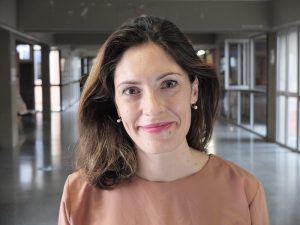Elisabetta Aurino awarded an ERC grant for her groundbreaking research on adolescent development
 Elisabetta Aurino is a development economist working on food security and child and adolescent health, nutrition and education. Her research aims to contribute to positive societal change through better food security, health and education for all children.
Elisabetta Aurino is a development economist working on food security and child and adolescent health, nutrition and education. Her research aims to contribute to positive societal change through better food security, health and education for all children.
Aurino is Assistant Professor of Development Economics at the University of Barcelona School of Economics since January 2022, and is the recipient of a Starting Grant from the European Research Council (ERC) for her project “Leveraging Early Adolescence for Development: Longitudinal and Experimental Evidence from Ghana”. She is also recipient of a prestigious ‘Jacobs Foundation’ fellowship, a globally-competitive grant for multidisciplinary scholars working in child development.
The work focuses on early adolescence (10-14 years) a delicate stage in human life during which strategic interventions can have a dramatic impact on individual future well-being, both in terms of seizing opportunities and in preventing health or economic risks. Unfortunately, evidence on ‘what works’ at this stage is scarce, especially in economically disadvantaged world areas, where 90 % of the world’s 1.2 billion adolescents live. Further, we don’t currently know whether investments at this stage can boost effectiveness of support received earlier in life (e.g. early childhood care) or make up, at least partially, for early-life poverty.
Aurino’s research aims to address this lack of evidence by developing and testing an innovative and digital parenting program to support adolescents in Ghana. This intervention will be tested by relying on a sample of 2,500 children and their parents. This sample is unique as children were part of a randomised experiment testing whether improved quality preschools were effective for their academic and social development in 2015, and were followed up since.
This experimental and longitudinal sample will allow to test the complementarities between early childhood and early adolescence investments, or whether interventions in adolescence can compensate for previous lack of support during the early years. Children and their parents will be interviewed using quantitative and qualitative surveys at 13, 15 and 17 years. Outcomes include adolescent social-emotional and academic skills, health, and adult-life transitions, such as school drop-out, early marriage and work. Innovative measures of stress biomarkers will be also collected.
Recent news
- UB School of Economics is recruiting two tenure-elegible lecturers
- Call for expressions of interest: PhD Fellowships in Economics
- MSc in Economics Graduates celebrate their academic achievements at the graduation ceremony 2024
- The 2024 edition of our Summer School on Poverty and Inequality concludes successfully
- UB School of Economics to host the XVI edition of the Labour Economics Meeting
- UB research study shows the working conditions of scrap metal dealers and their role in the recycling process in Barcelona
- The Digital Shift: Examining the Growth of Remote Work in Europe
- Ageing Populations: A Barrier to Strong Climate Action?
- Germà Bel and Montserrat Guillén, among the Best Economics and Finance Scientists in Spain in the Research.com ranking

Sorry, the comment form is closed at this time.